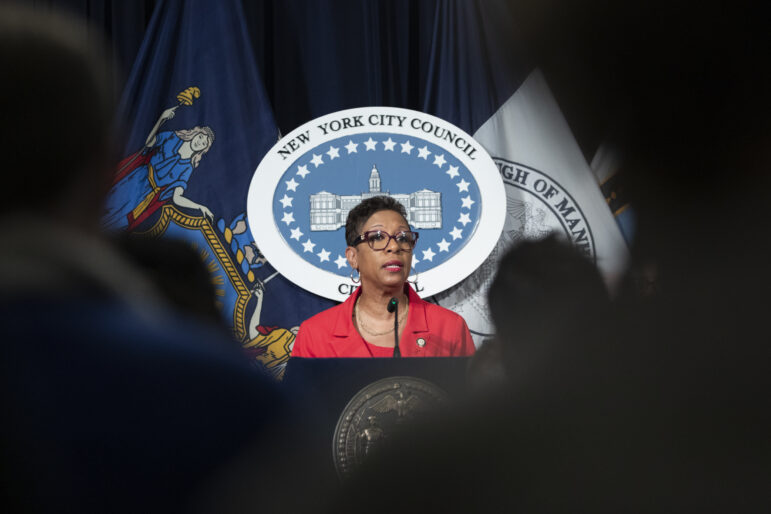The New York City Council cleared Speaker Adrienne Adams to take legal action on its behalf Thursday, but the leader declined to say how, or when, she might act to enforce new laws expanding eligibility for city-issued rental vouchers.

Emil Cohen/NYC Council Media Unit
Council Speaker Adrienne Adams at the body’s pre-stated meeting on Feb. 8.The New York City Council cleared Speaker Adrienne Adams to go to court on its behalf Thursday, but the leader declined to say how, or when, she might act to enforce new laws expanding eligibility for city-issued rental vouchers.
“There has been no final decision yet on any legal action, but this maintains our ability to keep our options open,” Adams told reporters ahead of the Council’s stated meeting.
The speaker gave Department of Social Services (DSS) Commissioner Molly Wasow Park an ultimatum in early January, saying the Council would have “no other option but to take legal action” if the agency failed to implement reforms to the City Family Homelessness and Eviction Prevention Supplement, or CityFHEPS, program by Feb. 7.
Mayor Eric Adams initially vetoed the reforms last summer, but the Council overrode his veto in July, in what amounted to the body’s first override since Michael Bloomberg’s mayoralty. The laws were supposed to take full effect by early January.
Thursday’s resolution states that Mayor Adams “has not responded to the Speaker and has left the Council with no other alternative but to seek relief from the courts.”
Yet it remains unclear how the Council will proceed. The body may team up with outside groups or impacted New Yorkers, Deputy Council Speaker Diana Ayala told City Limits Thursday.
“I don’t think that anybody should take it as an indication that the speaker will directly sue,” she said. “This opens the door for a lot of possibilities. The speaker can decide that she will file a suit on behalf of the body, or the speaker can decide that we will join a lawsuit. That hasn’t been decided.”
The Legal Aid Society has also indicated that it plans to sue, and confirmed as much Thursday, but declined to comment further.
Mayor Adams has already hinted at an illegality defense, saying at his June veto signing that the CityFHEPS package impedes on state authority.
In response, the Council pointed to other recent examples of CityFHEPS legislation— including a 2021 bill that increased the value of the vouchers—that passed and were implemented without incident.
Launched in 2018, the CityFHEPS program allows tenants to pay part of their income in rent, up to 30 percent, while the city covers the rest, up to a fixed maximum. More than 36,000 households currently receive these vouchers.
At issue are Local Laws 100 through 102 of 2023. Closely interrelated, together they extend CityFHEPS eligibility to people experiencing homelessness outside of traditional Department of Homeless Services (DHS) shelters, including youth, in addition to raising the income ceiling and eliminating work requirements.
Significantly, the laws also expand CityFHEPS eligibility among those not in shelter, covering income-qualifying tenants who receive formal notice that they are behind on rent and could face eviction.
They also eliminate a 90-day waiting period to become eligible for CityFHEPS in shelter—a change Adams plucked out and implemented last summer before vetoing the Council bills.
City Hall has agreed to implement another law, Local Law 99, to help voucher recipients use their subsidy to cover utility costs.
In a December letter to Deputy Speaker Ayala, Park of DSS cited “substantial financial, operational and legal issues” with Local Laws 100 through 102.
In a further statement, a City Hall spokesperson said the laws would increase competition for a finite number of affordable apartments and, on top of the cost of sheltering tens of thousands of asylum seekers, “will only force more painful budget cuts onto working-class New Yorkers.”
In a separate press release Thursday, the city announced a plan to speed up contracts with nonprofit providers to move 1,500 CityFHEPs voucher holders from shelter into apartments.
The announcement is welcome, Speaker Adams said Thursday. However, the full CityFHEPS package is “absolutely the stand that we still have.”
Cost estimates for its implementation vary widely—anywhere from $3 billion to $36 billion over five years, according to a recent analysis by the Independent Budget Office (IBO). City Hall has pegged the cost at $17 billion.
The cost is difficult to project, according to IBO, partly because the city does not track the volume of tenant notices that, under the new laws, could make more New Yorkers eligible for CityFHEPS outside of shelter.
There is also a lack of consensus around how many New Yorkers are entering shelters after being evicted—a question central to the debate, since city shelters are currently full to bursting.
According to DSS, an average of about 4 percent of families who enter DHS shelters each month report receiving an eviction notice in the year prior, compared to 10 percent before asylum seekers began entering the system in large numbers in 2022. But IBO has countered that this data excludes informal evictions.
Proponents of the CityFHEPS laws say they can help low-income renters hold onto their homes and avoid the stress of eviction, while extending eligibility to homeless populations that don’t live in traditional DHS shelters, like young people in their late teens and early 20s.
“We look forward to the Council and our legal allies taking prompt action to enforce the implementation of these laws,” said Jamie Powlovich, director of the Coalition for Homeless Youth. “Every day that passes that people are forced to remain in shelter or on the streets simply because of the mayor’s unlawful actions is a day too long.”
To reach the reporter behind this story, contact Emma@citylimits.org. To reach the editor, contact Jeanmarie@citylimits.org.








